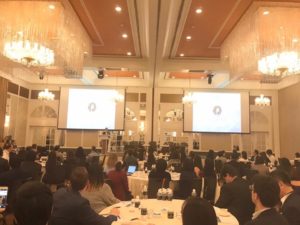In mid-April, one of the personnel at a global immigration law firm came to me after seeing me in a series of TV interviews on current international affairs, and explained that his firm wants me to give a keynote at an upcoming immigration conference his firm will be hosting. He had looked up my research profile and thought that my work on US protectionism gave me the perfect background to give the speech. It turned out to be an interesting experience.

Providing keynote speech, ‘The Rise of Protectionism in the West and its Impact on the East’ at the FRAGOMEN APAC Immigration Conference, InterContinental Singapore, June 7, 2017.
I thought that in the age of uncertainty – travel bans, visa restrictions, automation, and the case against immigrants across the board in industrialized countries – I should provide a concise analysis on how I see the current phenomenon in the context of international relations based on my experiences. I ended it with the following:
PAY IT FORWARD:
Open up your minds as local nationals and learn the languages and cultures of the immigrants, and vice versa.
Be lovely to the people around you, and listen to them. We have enough hatred and war in this world, and treating each other with love, understanding, and respect is the very least we can and must do in order to get through this together. Otherwise, trust will never be regained.
I think my personal message and suggestions in the speech may have resonated with a certain number of people in the audience, because many of them came up to me one by one to tell me their stories living their lives either as expats or immigrants to another nation. Some wanted me to explain to them why uncertainty is prevailing in this world right now and what would happen next.
Academics are at their best in their analyses within the academia, but I strongly believe in the responsibility as intellectuals to engage with the public, media, and the industry to help the society go forward. I think that this was a learning experience that proved to be a testament to my beliefs.
